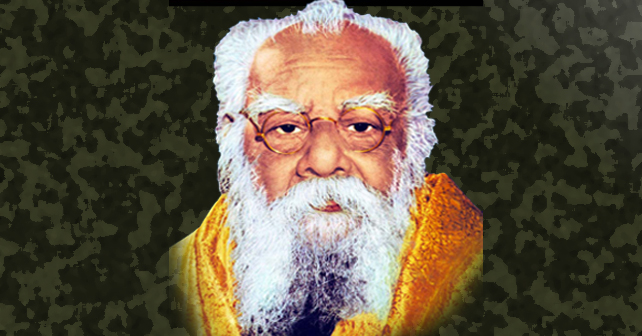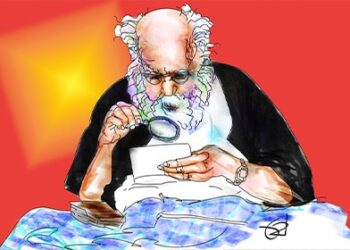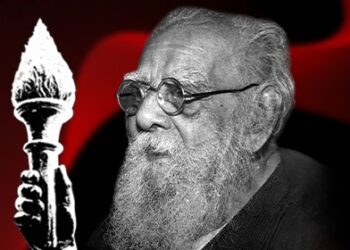With the advent of the Self-Respect movement in the country, and particularly since it gained some popularity, a certain amount of intellectual disturbance is noticeable amongst the people. At the same time the activation of counter propaganda on the part of the people, who either live by religion or enjoy privileges thereof, is also noticeable. This counter propaganda backed by age old pietism and superstition, has, I am aware, unnerved some social reformers and rationalists. For these reasons, I find it necessary to explain our position in regard to God and religion so that the genuine rationalists and those who would like to go with them may not be assailed by doubts or be not unaware of the dangers.
Probe into the mysteries
Let it be understood at the outset that we are people who are not in the least bothered about god or religion and that our principal purpose is to break the shackles that keep our people away from happiness, knowledge and freedom. Strictly speaking, there is no need for Self-Respecters to probe into the mysteries or magic or god or religion; we have been obliged to do so only because these are persistently thrown before us to thwart us in our purpose.
Out of ignorance
It has been maintained that only those, who believe in and worship the heroes of our Puranas as gods, are theists and the rest are anti-god and anti-religion. Nevertheless, it would be desirable to examine what this god or religion is, why they were created, and whether it was out of fear, from good or bad motives, or out of ignorance. For this purpose it would be enough to examine the nature of God, described as a being without a name or form, and of religion, held up as useful to mankind. It may not be necessary to go into details into which religion is divided or subdivided, for the very simple reason that the propagators of the different religions have already spent much energy, time, and money in condemning the beliefs and practices of one another and damaging each other in their missionary zeal. The result, however, is that one has failed to convert or destroy the other and has ended in each just trying to save his particular gods, prophets and creeds and practices. No one has been able to justify his god or creed on the basis of wisdom, justice and truth.
Children tutored of god
Let us see how and when the god-idea came amongst men. The idea must certainly have arisen only after man had grown up and begun to think, because even today, man begins to speak about god only after he has been told and taught about it from childhood onwards. It does not come of its own accord. It is only after little babes are shown idols and other objects as “Samis” (Deities) or gods and made to worship them by the elders helping the little ones to cup their hands, or join their palms that they begin to learn about god. Even so, the idea about god must have come to ancient man only after he was born on earth and before he reached the thinking stage. And yet the thing called god is taken to be responsible for the creation of the universe, its maintenance and destruction,
When was Sakthi made?
The question is how and when this primeval energy personified as Sakthi came to be identified with God by early man. So far as our country is concerned, we can only find the causes through our popular gods. The earth, mountains, wind, fire, sun, moon, rivers, stars, rain, lightning, dreadful diseases, monstrous animals, etc. make up our gods. It must be plain at a time when the ancients were not able to know the truth about all these things, they made them all gods for fear of them. The Mountain Himalayas for instance was considered to be and worshipped as the seat of gods, from whose head the rivers originated. When people knew nothing about the lands beyond the Himalaya Mountain, all those lands were regarded as celestial lands even as the southern and eastern lands were taken for “pathala (subterranean) Ioka” and “Naga loga” (World of snakes) respectively.
Even magic was godly
Even to this day, man ascribes divinity to all those phenomena that are still beyond his intellect and research. Do we not see youngsters and illiterates regarding the magician as doing something divine just because they are not in a position to see the tricks behind the magic? The attitude of those of us who know the truth with reasoning, is simply to dismiss magic as a combination of tricks expertly done in swift movements, about which we do not know the details, but in which we are certain there is no divinity. Hence what appeared to the same person in his youth as something divine turns out to be simple magic as soon as he is able to judge things for himself, purely because the man has acquired some knowledge. What appears to the layman even now as divine, has ceased to be so, for the scientist. What is still awe-inspiring and divinely wonderful for the Easterner, has been laid bare as understandable truth by the Westerner.
Snake swallowing Sun and Moon
There was a time when our people regarded eclipses of the Sun and the Moon as the evil manifestations of invisible monstrous snakes called Raghu and Kethu periodically perpetrated on the sungod and the moongod. We have Puranas to say that the Sun came under a curse to suffer periodic eclipse, and that to save the sungod from the danger, all people had to take a bath and propitiate the great god. It must be obvious that these beliefs arose at a time when people did not know much about astronomy. Like wise, when the causes of formation of clouds and rain were discovered, the clouds, the rain and the rivers ceased to be gods.
Gun-powder and god
Fear of epidemics and ignorance of methods either to prevent or cure them, created for the people many more gods and goddesses. With the advancement in the principles of hygiene and medicine, the propitiation of deities for diseases like cholera, plague and small pox has become less and less. With the invention of gunpowder and fire-arms, the fear attached to wild beasts like the tiger and the lion got obliterated. What therefore is still beyond human ken, continues to enjoy divine powers, but is sure to dwindle as science and technology progress. What is godly to one is otherwise to another, and this is dependent of the stage to which the one and the other’s knowledge has reached.
Sentimental satisfaction
To-day when the Westerners invent some gadget, which we do not understand, much less make for ourselves, we do not immediately credit the Western scientist with divine powers. We must be proud I suppose of that much progress, but so long as full and complete knowledge of the world is wanting, the idea of god will persist. The man who is disappointed after hard labour and expectation, and the man who is unable to make good any serious loss, will continue to obtain sentimental satisfaction by ascribing the result to divine powers or fate.
Blame or praise for failure or success
A being or power that is above us controlling all things, acts as the source of hope and refuge in danger for the uninitiated. But those who try to understand nature, either are aware of human limitations or are prepared to admit that certain things are simply beyond their understanding or control. It must therefore be clear that ideas about god and divinity differ in accordance with the state of scientific knowledgle of different people. The blame or praise accorded to god for failure or success in life varies in proportion to the intellectual advancement of different people.
Science has opened up many of nature’s mysteries and exploded the miracle in many phenomena. It can therefore be said that faith in god progressively declines with advancement rational in knowledge; and where there is less of science there is more of god in lands where rationalism has not made much headway, people discern the hand of god in almost everything they touch and see. We still notice among our masses some people getting god – possessed. It is only among barbaric people that stories about gods and goddesses possessed of all human and beastly passions find favour.
Puranas believed no more
People, who some time ago believed in the Puranas (Mythologies) as true stories of god-men on earth, are to-day hesitant in their avowals; but in order to cover their ignorance and vested interests, they try hard to import science into their old Puranas. Indeed they are finding it hard to retain the faith of people, who are increasingly taking courage to reject whatever science has proved to be false and make-believe. Artificial rain, bringing back the dead to life though for a little while, the radio and the cinema, have all emphasized man’s inventive genius and ability to conquer nature. Even the masses have not failed to be impressed by these scientific achievements though it must be admitted that their old faith in tradition and superstition, though shaken, has not disappeared.
The intelligent man is in general an arrogant man. He thinks himself to be all wise and therefore refuses to admit the truism “I do not know” when anything is beyond his reach; instead he quietly brings in god to his aid. It is not easy to change this nature unless wisdom is available in full measure. There are those amongst us, who for selfish reasons and material gain, will continue our blind faith, though subjectively convinced of their untruth, only to continue our exploitation of the credulous masses. There are many, who can subsist only if religion and superstition prevail; and they will leave no stone unturned to keep their trade going, whatever the bad effect on the people.
Fist error committed by man
Early man, when he emerged from a savage nomadic existence to settle down in colonies, found the need for some rules of life, for no co-operative society or association can function even for a day without accepted or enforced rules. These rules of conduct slowly developed into religion. To enforce these rules, penalties were imposed for disobedience. When penal provisions were found not to act properly, or when people were found to disregard the rules in private or act against them in secret, the rulers must have deemed it necessary either for public good or selfish ends or both to add the sanction of god to the rules. When people were told that the displeasure of the gods would attack them, even when rules were disregarded in private homes or secret places, the enforcement of order in society must have become easier and simpler. Indeed the rulers must have found that it was easier to deceive and exploit the people in the name of god and religion, by saying that “god made the rules” and that “god would punish them for disobedience, if not in this life definitely in the next life”, and so on. I believe that this was the time when man committed his first error.
“My religion is truer and bigger”
To examine the nature of the rules of conduct, it has to be noted that the physical condition of the country, the character of the people, and age of civilization, in other words, place, people and time, have mostly determined them. The innocence and ignorance of the masses and the selfish aggrandizing tendencies of the privileged and exploiting classes also played a large part in determining the rules, more particularly of the latter. When however the rules do not suit a certain section, either because of the lapse of time or a change in the condition of the people, a section detached itself from the main community and set itself up elsewhere, either by simple colonization or by conquering and subjugating weaker people in a distant land. Thereafter a new set of rules or a new religion in some ways different from the old one slowly evolved itself, and more often than not stood in opposition to the older religion, giving room for the fanatics to say, “my religion is bigger and truer”. The seeds for hatred and warfare would then have been sown truly and well.
Confusion worse confounded
Religious and temporal leaders have on occasion tried to bring about peace in the affairs of the tribes, not so much by abandoning the old rules as by interpreting the old rules in a new light. These efforts have only ended in creating new religions or creeds without ever liquidating the old religion sought to be reformed. These subdivisions and multiplications of religion have made confusion worse confounded in the mater of establishing any truth but have definitely succeeded in solidifying certain creedal practices and rituals as peculiar to each group, and these alone differentiate and divide the people. The essentials of early religious social conduct would not only have vanished into oblivion, but would have been metamorphosed into something opposed to the original principles, in as much as the rules have been changed and adapted to serve the selfish and exclusive purposes of the privileged classes. This is actually what we witness to-day in almost all religions. The mass of the people are misled, misguided and deceived to serve and slave for the benefit of a lazy priestly class, and arrogant aristocracy, or a supine plutocracy.
Murder and misery by religion
The evil effects of religion are apparent to all those who wish to see. In the first place man’s intellect gets very badly influenced. The bigot, who pins his faith in his own religion and his own god, fails either to grant a similar status to another religion or to discredit his god for having allowed the other religion or religions to come into being.
Nobody seems to ask whether god will create different religions only to make them fight each other and create bloodshed, murder and misery in the grand design. This simple truth does not even reach the subtle brains of the great Acharyas or prophets. Instead, each one struts about as the most correct and truest intermediary of god on earth, born for the set purpose of leading man to godhead. How far religion has despoiled men’s minds by the above process can be gauged by the religious wars and fights, that fill man’s history on earth.
Secondly religion has divided man from man instead of uniting all mankind in one fold. Thirdly, religion is primarily interested in making the faithful conform to certain outward forms or peculiar dress, and not stressing correct conduct or culture. Fourthly, there is no scope whatsoever for a rational approach to questions of religion, for every religion insists on blind belief without question some propositions and tenets albeit unacceptable to conscience or intellect. Nor is it permissible for the faithful to believe a part and doubt or disbelieve the rest. Fifthly, religion creates as set of go-betweens or brokers between god and man and makes the practices and interpretations of these brokers or priests authoritative and far superior to the commonsense and practical experience of the laymen. Lastly, religion prescribes salvation in proportion to the money spent on the priests and the temples, however heinous the sins of the man may be. This complacent solution helps man to amass wealth by atrocious means and live later in lazy luxury unconscionably built on the sweat and toil of the common man.
Furthermore religion makes men cowards in life. Truth, freedom, and self-respect are lost to the religionist. Superstition reigns supreme. The Saivite devotee concludes that all his sins will be washed away, if only he smears a little ash on his body. Scoundrels and humbugs pass as pious specimens of humanity by painting some religious mark prominently on their foreheads. Indeed these marks have come to cover hypocrisy, blackmarketing, deceit and cunning. An ardent Vaishnavite proclaims that if the name of Rama is once uttered, all sins will evaporate, since Rama is the only god to give salvation. Even so the pious Christian believes that Jesus alone can lead men to heaven, and that no other god can even offer any warmth. Like wise the Muslim believes that every word in the Koran is god’s own word and that not a line in it could be changed. If such is the attitude of each religion, one wonders where the truth is to be found and how peace can be secured.
Source : Collected Works of Periyar E.V.R
Published by The Periyar Self-Respect
Propaganda Institution, Chennai.






